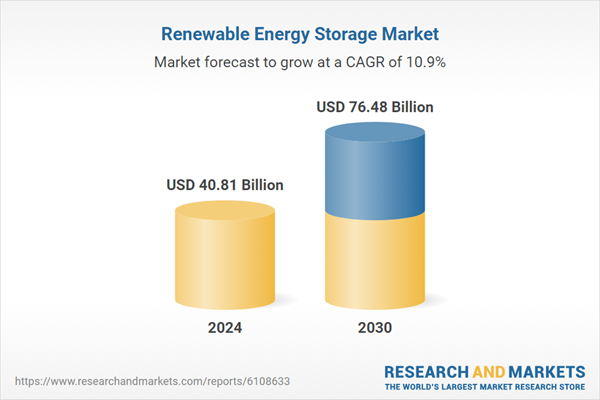Speak directly to the analyst to clarify any post sales queries you may have.
10% Free customizationThis report comes with 10% free customization, enabling you to add data that meets your specific business needs.
As renewable energy production is inherently variable and weather-dependent, energy storage solutions are vital to ensuring grid reliability, stability, and consistent power availability. The market includes a diverse array of storage technologies ranging from battery systems and pumped hydro storage to emerging alternatives like compressed air and thermal storage. The ongoing transition toward clean energy, coupled with decarbonization policies, smart grid development, and technological advancements, continues to propel the adoption of energy storage systems across residential, commercial, industrial, and utility-scale applications.
Key Market Drivers
Rising Integration of Renewable Energy Sources into Power Grids
A major force driving the growth of the renewable energy storage market is the increasing incorporation of solar, wind, and hydropower into power grids worldwide. Renewable generation is subject to fluctuations due to variable sunlight, wind speeds, and seasonal conditions, making consistent electricity supply a challenge. Energy storage systems help bridge this gap by storing excess energy generated during peak production and releasing it when renewable output declines or demand surges. The growing share of renewables in global energy portfolios is creating an urgent need for scalable, efficient storage technologies that can enhance grid flexibility and accommodate decentralized energy sources. This is particularly crucial in regions with ambitious clean energy targets and growing investments in wind farms, solar parks, and hybrid renewable systems.Key Market Challenges
High Capital Costs and Economic Viability Issues
The high initial investment required for energy storage deployment remains a significant barrier to widespread adoption. Building large-scale storage systems - such as lithium-ion battery arrays, pumped hydro, or flow batteries - requires considerable capital outlays. These include not just the cost of the technology itself, but also expenses tied to permitting, grid interconnection, power conversion systems, land acquisition, and ongoing maintenance. Such financial hurdles are especially challenging for emerging economies and small-scale developers. Moreover, the economic returns on storage investments can be uncertain due to fluctuating energy prices, regulatory limitations, and the complexity of monetizing grid services like frequency regulation or peak shaving. These factors collectively pose obstacles to faster market penetration despite rising demand.Key Market Trends
Integration of Artificial Intelligence (AI) and IoT in Renewable Energy Storage Systems
One of the most impactful trends shaping the renewable energy storage market is the adoption of AI and IoT technologies to create intelligent, data-driven storage solutions. AI algorithms are increasingly being used to forecast energy consumption, optimize charge-discharge cycles, and manage power flows across distributed energy resources. These tools enable greater efficiency, reduce energy loss, and improve grid responsiveness during peak or off-peak hours. IoT devices, integrated with storage units, provide continuous monitoring of critical parameters such as battery state of charge, voltage, temperature, and system health, allowing for predictive maintenance and real-time performance tuning. Together, AI and IoT are enabling more dynamic and resilient energy ecosystems, supporting the seamless integration of renewables into both centralized grids and decentralized microgrid systems.Key Market Players
- Tesla, Inc.
- LG Energy Solution
- Samsung SDI Co., Ltd.
- BYD Company Ltd.
- Fluence Energy, Inc.
- Siemens Energy AG
- ABB Ltd.
- Enphase Energy, Inc.
- NextEra Energy, Inc.
- VARTA AG
Report Scope:
In this report, the Global Renewable Energy Storage Market has been segmented into the following categories, in addition to the industry trends which have also been detailed below:Renewable Energy Storage Market, By Source:
- Wind
- Hydroelectric
- Solar
- Bio Energy
- Others
Renewable Energy Storage Market, By Application:
- Residential
- Industrial
- Commercial
- Utility-Scale
Renewable Energy Storage Market, By Region:
- North America
- United States
- Canada
- Mexico
- Europe
- France
- United Kingdom
- Italy
- Germany
- Spain
- Asia-Pacific
- China
- India
- Japan
- Australia
- South Korea
- South America
- Brazil
- Argentina
- Colombia
- Middle East & Africa
- South Africa
- Saudi Arabia
- UAE
- Kuwait
- Turkey
Competitive Landscape
Company Profiles: Detailed analysis of the major companies present in the Global Renewable Energy Storage Market.Available Customizations
With the given market data, the publisher offers customizations according to a company's specific needs. The following customization options are available for the report.Company Information
- Detailed analysis and profiling of additional market players (up to five).
This product will be delivered within 1-3 business days.
Table of Contents
Companies Mentioned
- Tesla, Inc.
- LG Energy Solution
- Samsung SDI Co., Ltd.
- BYD Company Ltd.
- Fluence Energy, Inc.
- Siemens Energy AG
- ABB Ltd.
- Enphase Energy, Inc.
- NextEra Energy, Inc.
- VARTA AG
Table Information
| Report Attribute | Details |
|---|---|
| No. of Pages | 180 |
| Published | July 2025 |
| Forecast Period | 2024 - 2030 |
| Estimated Market Value ( USD | $ 40.81 Billion |
| Forecasted Market Value ( USD | $ 76.48 Billion |
| Compound Annual Growth Rate | 10.8% |
| Regions Covered | Global |
| No. of Companies Mentioned | 10 |









